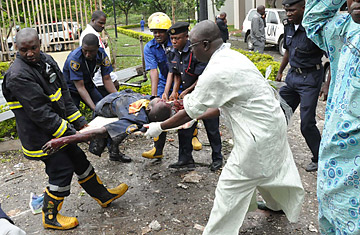
Rescue workers evacuate a wounded man from the U.N. building in Abuja, the Nigerian capital, on Aug. 26, 2011
The bomb-laden Honda Accord that slammed through two sets of front gates at the United Nations compound in Nigeria's capital, Abuja, on Friday morning, Aug. 26, was the vehicle for the boldest terrorist attack yet perpetrated by Nigerian militants. The blast that ensued when the car's driver pulled into the reception area and detonated his cargo punched gaping holes in the building's first two floors, left the attacker's body in three pieces and killed at least 18 U.N. workers, injuring eight others. As emergency workers rushed to the capital's leafy diplomatic area, easing the wounded down on stretchers, fingers pointed to Boko Haram, the radical Islamic sect responsible for a recent string of attacks in the area, including a deadly June bombing of the city's police headquarters.
Worldwide condemnation came quickly, including a statement from U.S. President Barack Obama that "The people who serve the United Nations do so with a simple purpose: to try to improve the lives of their neighbors and promote the values on which the U.N. was founded — dignity, freedom, security and peace." Nigerian President Goodluck Jonathan condemned what he called a "barbaric, senseless and cowardly attack." It was the deadliest on the U.N. since 17 U.N. civilian staff members were killed along with dozens of other people in two terrorist car bombings that targeted the U.N. and other premises in Algiers in December 2007.
Friday afternoon, a spokesman for Boko Haram told the BBC in a phone call that it had carried out the attack. He was speaking with the BBC's Hausa-language shortwave-radio service, which is widely listened to throughout Nigeria's Muslim north. The sect reportedly has links to al-Qaeda and has made such claims to the service before.
Friday's attack is "similar to the bombing of police headquarters, in terms of methodology," says Thomas Cargill, assistant head of the Africa program at Chatham House, a London-based think tank. "It's most likely the Boko. This has all the hallmarks of their operations," says Peter Lewis, director of Africa studies at the School of Advanced International Studies at Johns Hopkins University. "It fits in with the package they've used on previous attacks, and it comes during a time when they've been attacking the frequency and audacity of their attacks." Both spoke before Boko Haram claimed responsibility to the BBC.
The group members have increasingly targeted government and international installations, using more and more sophisticated methods, including IEDs. "This was their boldest attack yet, in terms of international visibility and targeting an international operation," Lewis tells TIME. Though there's no direct agenda of targeting the U.N., "they want to raise their visibility, and they want to demonstrate to the Nigerian government and to a global audience that the Nigerian state is not capable of security," even in Abuja. Cargill, who has often worked in the U.N. building, says security in the area was never "particularly tight. Driving a car in there with explosives would be relatively easy," he maintains. More than 400 U.N. workers from 26 agencies work in the building, located half a mile (about 0.8 km) from the U.S. embassy.
The specific targeting of the U.N. is meant "to draw attention to [Boko Haram's] plight," says George Ayittey, an economist and the president of the Free Africa Foundation in Washington. Staging a high-profile attack on an international organization is "a normal ploy of rebel movements in Africa," he says. It could also be an attempt to gain credibility within the African terrorism community. Earlier in August, General Carter Ham, commander for the U.S.'s military operations in Africa, told the Associated Press there was evidence that Boko Haram could be trying to join forces with al-Qaeda in the Islamic Maghreb, based in Northwest Africa, and Somalia's al-Shabab, in order to launch more drastic attacks in Nigeria.
For years, Nigeria, with a population of 150 million, has been split between the Christian South and predominantly Muslim North. Boko Haram, commonly referred to as the "Nigerian jihad," has been fighting to implement a strict version of Shari'a and has increased its attacks since the May 29 inauguration of Jonathan. It regularly attacks police stations and banks throughout the North in order to finance its operations.
Though the group's exact size is hard to pinpoint, Lewis says the number of followers within the Muslim community "is quite substantial," with upwards of several thousand supporters and at least 300 militant members who are available for armed actions.
The government has attempted to crack down on the movement in the months since June's bombing. But as the divide between Nigeria's rich and poor continues to expand with the discovery of more and more oil, the sect has had no trouble culling followers from the legions of disenfranchised in the North. Friday's attack "underlines the important note that northern groups are more and more involved in this activity because of a sense of marginalization, and it's important for Jonathan to provide better services" — including regular electricity and financial incentives — "to a North that feels marginalized," Cargill says.
In 2009, Nigerian security forcefully destroyed Boko Haram's Maiduguri compound and killed its then leader Mohammed Yusuf. That had the opposite effect of what the government intended, leading, according to Lewis, to "provocation and an increase in empathy for the organization." After months of dormancy, Boko Haram returned to the spotlight in September 2010, pledging to avenge Yusuf's death. With Friday's attack, its threats have come to fruition.
